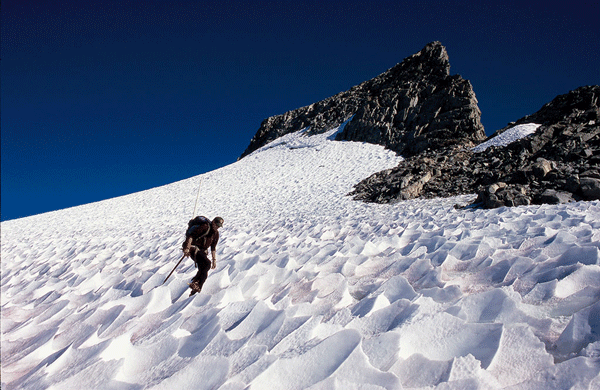Welcome to the GEOS 420, Earth System Modeling, webpage for the Spring 2021 semester.

Above: Yosemite geologist Greg Stock studies the Sierra Nevada’s declining glaciers.
Photo by
Tim Palmer. For more, see his book California Glaciers.
Spring 2021 Lectures on Zoom: MWF, 10:00 - 10:50 AM.
Required book: The Earth System, 3rd Edition by Kump et al.
Mon. 25 Jan., Review syllabus and begin Chapter 14: Pleistocene Glaciation. Foraminifera and isotopes.
Weds., 27 Jan., Glacials and interglacials from sediment and ice cores. Evidence of glaciers and ice sheets.
Fri., 29 Jan., Earth orbital variations and Milankovitch theory; harmonics, superposition and spectral analysis.
Mon., 1 Feb., The Sun's luminosity, systems approach to modeling, KT boundary, volcanic eruptions.
Weds., 3 Feb., Pages 295-302 of Chapter 15: The Holocene, sunspot cycle, Maunder minimum, Little ice age.
Fri., 5 Feb., Review/discussion on material covered so far.
Mon., 8 Feb., Begin Chapter 2: Systems, components, couplings, feedbacks, and Daisyworld (p. 21 - 28)
Weds., 10 Feb., Complete Chapter 2: Daisyworld response to increasing solar luminosity (p. 28 - 33)
Fri., 12 Feb., Begin Chapter 3: Earth in comparison to nearby planets, nature of EM-radiation.
Mon., 15 Feb., Sun as a point source, inverse-square law, then Planck functions and blackbody radiation.
Weds., 17 Feb., Types of models and modeling. Then planetary energy balance with no atmosphere.
Fri., 19 Feb., Single-layer model of greenhouse effect. Then simple box models and differential eqns.
Mon., 22 Feb., Composition and mean vertical structure of the atmosphere. Energy transfer processes.
Weds., 24 Feb., Coarse look at absorption of radiation due to greenhouse gases and the Bouguer-Lambert law.
Fri., 26 Feb., Class cancelled due to illness.
Mon., 1 Mar., Spectroscopy of greenhouse gases: absorption lines, HITRAN.
Weds., 3 Mar., The influence of clouds on global climate.
Fri., 5 Mar., Parameterizations, radiative-convective models (RCMs), and general circulation models (GCMs).
Mon., 8 Mar., Complete Chapter 3. GCMs and Feedbacks. Begin Chapter 4. Atmospheric circulation
Weds., 10 Mar., Pressure gradients, hydrostatic eqn., barometric law, Coriolis effect, and geostrophic winds
Fri., 12 Mar., Special assignment #2.
Mon., 15 Mar., Spring break. No classes.
Weds., 17 Mar., Spring break. No classes.
Fri., 19 Mar., Spring break. No classes.
Mon., 22 Mar., Review special assignment #1.
Weds., 24 Mar., Continue discussion of scientific programming and special assignment #1.
Fri., 26 Mar., Conclude discussion of Special Assignment #1. Then resume atmospheric circulation.
Mon., 29 Mar., Summary of atmospheric circulation with emphasis on tropics, mid-latitude, and polar regions.
Weds., 31 Mar., Holiday: Cesar Chavez Day. No classes.
Fri., 2 Apr., General circulation of the stratosphere. Seasonal reversal of geostrophic flow and Brewer-Dobson.
Mon., 5 Apr., Begin Chapter 5: Ocean circulation. Ekman spiral.
Weds., 7 Apr., Ekman spiral, major ocean gyres, and convergence and downwelling in gyres.
Fri., 9 Apr., Divergence and upwelling, then begin eastern and western boundary currents.
Mon., 12 Apr., Planetary vorticity, the conservation of absolute vorticity, and asymmetry of ocean gyres.
Weds., 14 Apr., Begin El Niño and the Southern Oscillation, Walker circulation.
Fri., 16 Apr., Continue ENSO and impact of ENSO.
Mon., 19 Apr., Quiz on Chapter 5 (Upper ocean circulations and ENSO only.)
Weds., 21 Apr., Temperature, salinity, and density of sea water, and deep ocean circulations.
Fri., 23 Apr., Formation of bottom water, thermohaline circulation, AMOC.
Mon., 26 Apr., Heat engines, heat pumps, Sandstrom's theorem, and the thermohaline circulation.
Weds., 28 Apr., Complete Ch. 5 and begin Ch. 6: Cryosphere. Components of the cryosphere.
Fri., 30 Apr., Importance of the cryosphere, ice movement/dynamics.
Mon., 3 May, Formation of snow and glacial ice, briefly permafrost. Then begin sea ice.
Weds., 5 May, Complete Ch. 6. Sea ice, feedbacks, katabatic winds, polynya.
Fri., 7 May, Quiz on Ch. 6. Global Change: GMST and CO2.
Mon., 10 May, Carbon cycle, then methane and methane hydrates.
Weds., 12 May, Discussion of climate change: sea level rise, permafrost thaw, loss of glaciers.
Fri., 14 May, Review week
Weds., 19 May, Comprehensive final exam.
Dr. Mayor's page
